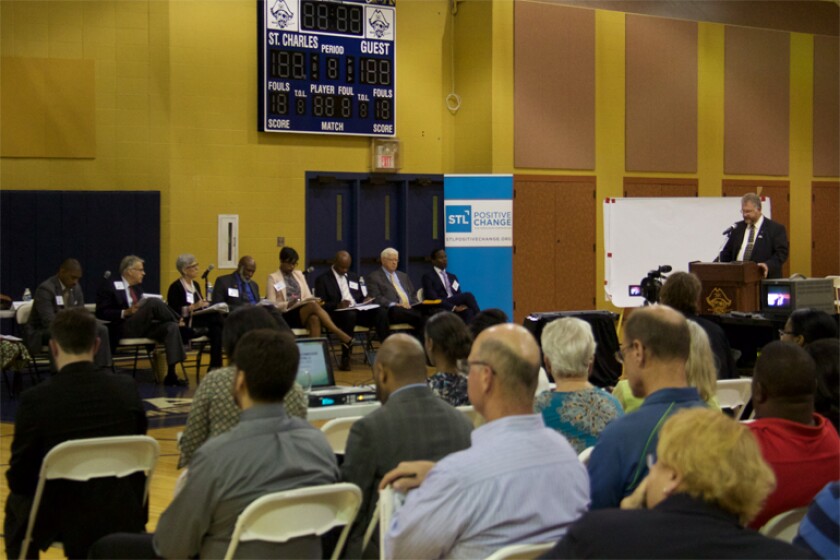But in the aftermath of the riots, members of the community have come together to try to create a healthier community for all of St. Louis county. The Ferguson Commission, an independent group made up of community members from different backgrounds, released a report in September arguing that public health disparities were a "key consideration" in the unrest.
"In mostly white, suburban Wildwood, Missouri, the life expectancy is 91.4 years. In the mostly Black, inner-ring suburb of Kinloch, Missouri, life expectancy is just 55.9 years. The law says all citizens are equal. But the data says not everyone is treated that way," the report found.
The health recommendations listed in the report include expanding Medicaid in Missouri, training public school teachers in areas of mental health and establishing more trauma support centers.
As protests and unrest continues, city and county officials have been turning to public health departments as a way to quell violence.
“Public health is the best tool we have to level the equity playing field. Anytime you have poverty, you’re going to be dealing with complications tied to mental health, trauma and addiction,” said Leana Wen, commissioner of Baltimore City’s Health Department.
When the Baltimore riots started this year, Wen said she thought she would be focusing on keeping hospitals well-staffed. What she didn’t anticipate was coordinating shuttle services to pharmacies that hadn’t been looted, creating 24/7 hotlines for people experiencing trauma and implementing healing circles in schools.
Health departments can get stuck focusing only on immediate tasks like disaster preparedness, restaurant inspections and tracking potential infectious outbreaks. This is often because of a lack of resources, but that should change, says Wen. “We hear about public health disparities when things go wrong, but it’s critical to put them on the map all of the time,” she said.
Members of the commission polled the community on various issues to determine the greatest inequities. Up to 78 percent of residents reported to be dealing with some form of toxic stress, which includes abuse, neglect, economic burdens, exposure to violence and substance abuse.
The St. Louis Regional Health Commission started ‘Alive and Well STL’ in 2014 to train residents to be community health workers to cut down on toxic stress burdens. It started in early 2014 before the unrest. But after the riots, the commission added TV spots that "greatly accelerated the number of individuals and organizations involved," said Robert Fruend, CEO of the St. Louis Regional Health Commission. "That said, we would not have been ready to capitalize on the interest had we not had over a year of groundwork in advance."
The commission has trained more than 1,000 people so far, which is a testament to how much people want to see health outcomes change in St. Louis, according to Fruend.

@_nathanlucy
The Ferguson Commission meets in a local high school gymnasium. (David Dwight)
“Crisis has a way of crystallizing action. After Ferguson, people have been able to jump through layers of bureaucracy and just go out and do stuff, like building shelters for homeless kids and start programs.” Fruend said.
He hopes the framework will "wake us up from our daily stupor of what public health departments should take on,” he said.
The beginning of the report makes it clear to "make no mistake: This is about race." The ultimate goal is racial equity. Public health is tied to that, according to Bethany Johnson-Javois, managing director of the Ferguson Commission. However, so are issues relating to education, the justice system and police reform. "Racial equity can't happen unless we transform all of the systems that underserve certain populations," she said.
Health experts in St. Louis said the report could be used to improve cities across the country -- volatile or not.
"Making sure our kids are fed and not experiencing violence is important throughout the country. We have giant life expectancy gaps across the country, and we need more people getting help for mental health issues. Take out the word Ferguson and someone would just read the report as common sense recommendations for any community," Fruend said.
"All too often public health departments are the first to get their funding cut, but we are the ones who give the greatest return-on-investment to our residents," he said.









